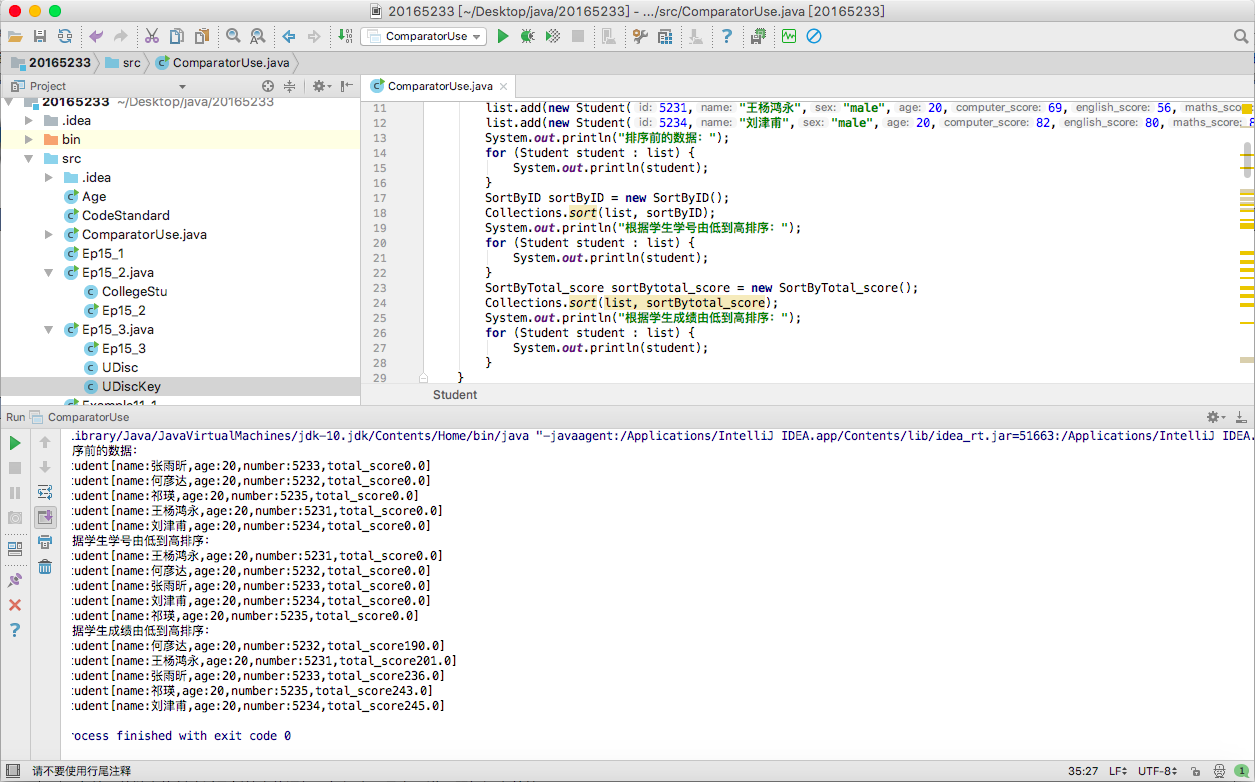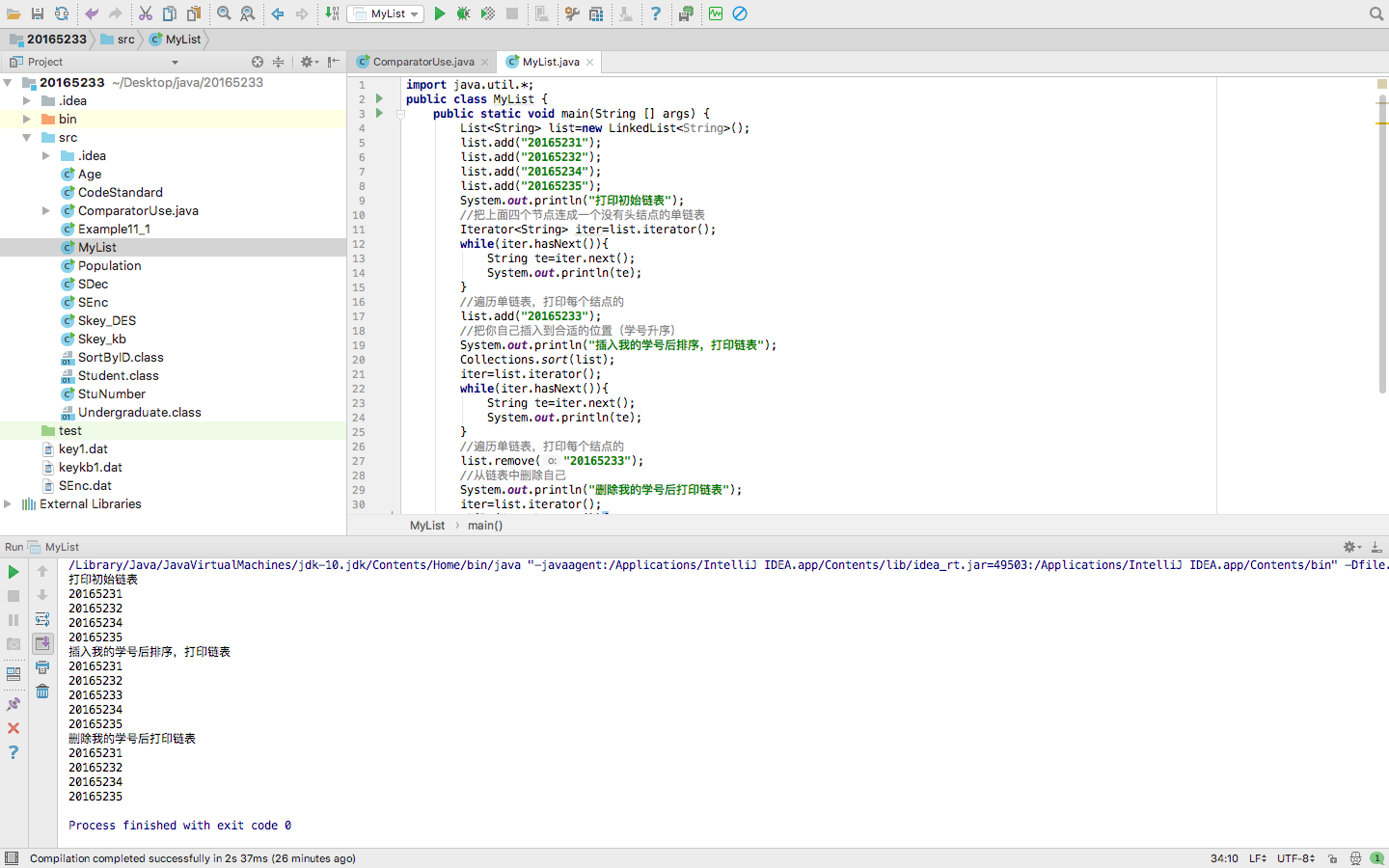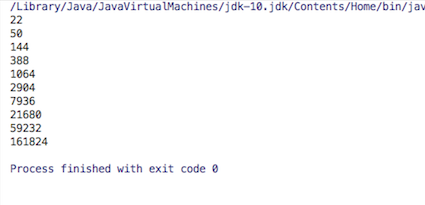20165233 第十周课下补做
20165233 第十周课下补做
相关知识点总结&代码与结果补充
课上习题2
-
数据结构和算法中,两种重要的排序方法:
- 有类的源代码,针对某一成员变量排序,让类实现Comparable接口,调用Collection.sort(List)
- 没有类的源代码,或者多种排序,新建一个类,实现Comparator接口 调用Collection.sort(List, Compatator)
-
创建一个空的链表
List<Student> list = new LinkedList<Student>();
- 向链表中添加新的结点
list.add(new Student(5233,"张雨昕","female",20));
- 代码实现
import java.util.Collections;
import java.util.Comparator;
import java.util.List;
import java.util.LinkedList;
public class ComparatorUse {
public static void main(String[] args) {
List<Student> list = new LinkedList<>();
list.add(new Student(5233,"张雨昕","female",20,80,67,89));
list.add(new Student(5232,"何彦达","male",20,79,66,45));
list.add(new Student(5235,"祁瑛","male",20,75,90,78));
list.add(new Student(5231,"王杨鸿永","male",20,69,56,76));
list.add(new Student(5234,"刘津甫","male",20,82,80,83));
System.out.println("排序前的数据:");
for (Student student : list) {
System.out.println(student);
}
SortByID sortByID = new SortByID();
Collections.sort(list, sortByID);
System.out.println("根据学生学号由低到高排序:");
for (Student student : list) {
System.out.println(student);
}
SortByTotal_score sortBytotal_score = new SortByTotal_score();
Collections.sort(list, sortBytotal_score);
System.out.println("根据学生成绩由低到高排序:");
for (Student student : list) {
System.out.println(student);
}
}
}
class Student {
private int id;//表示学号
private String name;//表示姓名
private int age;//表示年龄
private String sex;
private double computer_score;//表示计算机课程的成绩
private double english_score;//表示英语课的成绩
private double maths_score;//表示数学课的成绩
private double total_score;// 表示总成绩
private double ave_score; //表示平均成绩
@Override
public String toString() {
return "Student[name:"+name+",age:"+age+",number:"+id+",total_score"+total_score+"]";
}
public Student(int id, String name, String sex, int age,double computer_score,
double english_score,double maths_score) {
this.id = id;
this.name = name;
this.sex = sex;
this.age = age;
this.computer_score = computer_score;
this.english_score = english_score;
this.maths_score = maths_score;
}
public int getId() {
return id;
}//获得当前对象的学号,
public double getComputer_score() {
return computer_score;
}//获得当前对象的计算机课程成绩,
public double getMaths_score() {
return maths_score;
}//获得当前对象的数学课程成绩,
public double getEnglish_score() {
return english_score;
}//获得当前对象的英语课程成绩,
public void setId(int id) {
this.id = id;
}// 设置当前对象的id值,
public void setComputer_score(double computer_score) {
this.computer_score = computer_score;
}//设置当前对象的Computer_score值,
public void setEnglish_score(double english_score) {
this.english_score = english_score;
}//设置当前对象的English_score值,
public void setMaths_score(double maths_score) {
this.maths_score = maths_score;
}//设置当前对象的Maths_score值,
public double getTotalScore() {
total_score=computer_score + maths_score + english_score;
return total_score;
}// 计算Computer_score, Maths_score 和English_score 三门课的总成绩。
public double getAveScore() {
return getTotalScore() / 3;
}// 计算Computer_score, Maths_score 和English_score 三门课的平均成绩。
}
class SortByID implements Comparator<Student> {
@Override
public int compare(Student o1, Student o2) {
return o1.getId() - o2.getId();
}
}
class SortByTotal_score implements Comparator<Student> {
@Override
public int compare(Student o1, Student o2) {
return (int)( o1.getTotalScore() - o2.getTotalScore());
}
}
- 结果截图

课上习题3
-
有关单链表的创建以及新结点的添加知识点,见上一道习题知识点总结。
-
把结点连成一个没有头结点的单链表:链表中的结点是自动链接在一起的,不需要我们做链接,也就是说,不需要操作安排结点中所存放的下一个或上一个结点的引用。
-
遍历链表,利用迭代器
Iterator<String> iter=list.iterator();
while(iter.hasNext()){
String te=iter.next();
System.out.println(te);
}
-
按照学号进行升序排序:利用
public static sort(List<E>list)方法,可以将list中的元素按升序排序。 -
删除结点
list.remove("20165233");
- 代码实现
import java.util.*;
public class MyList {
public static void main(String [] args) {
List<String> list=new LinkedList<String>();
list.add("20165231");
list.add("20165232");
list.add("20165234");
list.add("20165235");
System.out.println("打印初始链表");
//把上面四个节点连成一个没有头结点的单链表
Iterator<String> iter=list.iterator();
while(iter.hasNext()){
String te=iter.next();
System.out.println(te);
}
//遍历单链表,打印每个结点的
list.add("20165233");
//把你自己插入到合适的位置(学号升序)
System.out.println("插入我的学号后排序,打印链表");
Collections.sort(list);
iter=list.iterator();
while(iter.hasNext()){
String te=iter.next();
System.out.println(te);
}
//遍历单链表,打印每个结点的
list.remove("20165233");
//从链表中删除自己
System.out.println("删除我的学号后打印链表");
iter=list.iterator();
while(iter.hasNext()){
String te=iter.next();
System.out.println(te);
}
//遍历单链表,打印每个结点的
}
}
- 运行结果截图

第十五章课后编程题
第1题:
使用堆栈结构输出an的若干项,其中an=2an-1+2an-2,a1=3,a2=8.
- 代码实现
import java.util.*;
public class Ep15_1 {
public static void main(String[] args) {
Stack<Integer> stack=new Stack<Integer>();
stack.push(3);
stack.push(8);
int k=1;
while (k<=10) {
for (int i=1;i<=2;i++) {
Integer F1=stack.pop();
int f1=F1.intValue();
Integer F2=stack.pop();
int f2=F2.intValue();
Integer temp= 2 * f1 + 2 * f2;
System.out.println(""+temp.toString());
stack.push(temp);
stack.push(F2);
k++;
}
}
}
}
- 运行结果截图

第2题:
将链表中的学生英语成绩单存放到一个树集中,使得按成绩自动排序,并输出排序结果
- 代码实现
import java.util.*;
class CollegeStu implements Comparable {
int english=0;
String name;
CollegeStu(int english,String name) {
this.name=name;
this.english=english;
}
@Override
public int compareTo(Object b) {
CollegeStu stu=(CollegeStu)b;
return (this.english-stu.english);
}
}
public class Ep15_2 {
public static void main(String[] args) {
List<CollegeStu> list=new LinkedList<CollegeStu>();
int score []={67, 66, 90, 56, 80};
String name []={"王杨鸿永","何彦达","张雨昕","刘津甫","祁瑛"};
for (int i=0;i<score.length;i++) {
list.add(new CollegeStu(score[i],name[i]));
}
Iterator<CollegeStu> iter=list.iterator();
TreeSet<CollegeStu> mytree=new TreeSet<CollegeStu>();
while (iter.hasNext()) {
CollegeStu stu=iter.next();
mytree.add(stu);
}
Iterator<CollegeStu> te=mytree.iterator();
while (te.hasNext()) {
CollegeStu stu=te.next();
System.out.println(""+stu.name+" "+stu.english);
}
}
}
- 运行结果截图

第3题:
有10个U盘,有两个重要的属性:价格和容量,编写一个应用程序,使用TreeMap<K,V>类,分别按照价格和容量排序输出10个U盘的详细信息。
- 代码实现
import java.util.*;
class UDiscKey implements Comparable {
double key = 0;
UDiscKey(double d) {
key = d;
}
@Override
public int compareTo(Object b) {
UDiscKey disc = (UDiscKey) b;
if ((this.key - disc.key) == 0) {
return -1;
} else {
return (int) ((this.key - disc.key) * 1000);
}
}
}
class UDisc {
int amount;
double price;
UDisc(int m,double e) {
amount=m;
price=e;
}
}
public class Ep15_3 {
public static void main(String[] args) {
TreeMap<UDiscKey,UDisc> treeMap=new TreeMap<UDiscKey,UDisc>();
int amount[]={1,2,4,8,16};
double price[]={867,266,390,556};
UDisc UDisc[]=new UDisc[4];
for (int k=0;k<UDisc.length;k++) {
UDisc[k]=new UDisc(amount[k],price[k]);
}
UDiscKey key[]=new UDiscKey[4];
for (int k=0;k<key.length;k++) {
key[k]=new UDiscKey(UDisc[k].amount);
}
for (int k=0;k<UDisc.length;k++) {
treeMap.put(key[k],UDisc[k]);
}
int number=treeMap.size();
Collection<UDisc> collection=treeMap.values();
Iterator<UDisc> iter=collection.iterator();
while (iter.hasNext()) {
UDisc disc=iter.next();
System.out.println(""+disc.amount+"G "+disc.price+"元");
}
treeMap.clear();
for (int k=0;k<key.length;k++) {
key[k]=new UDiscKey(UDisc[k].price);
}
for (int k=0;k<UDisc.length;k++) {
treeMap.put(key[k],UDisc[k]);
}
number=treeMap.size();
collection=treeMap.values();
iter=collection.iterator();
while (iter.hasNext()) {
UDisc disc=iter.next();
System.out.println(""+disc.amount+"G "+disc.price+"元");
}
}
}
- 运行结果截图



